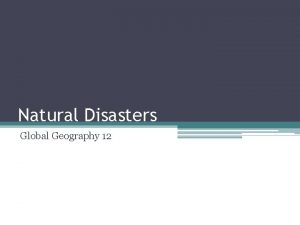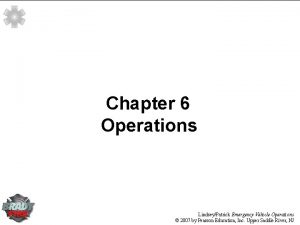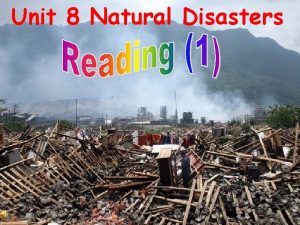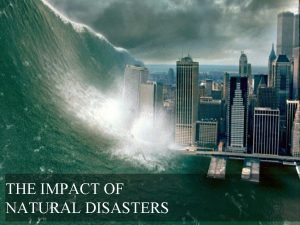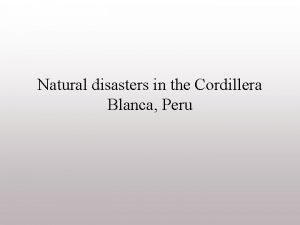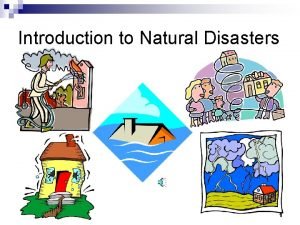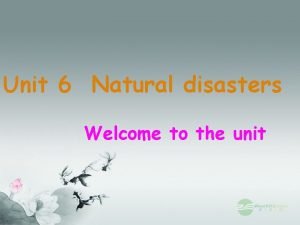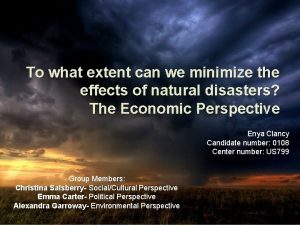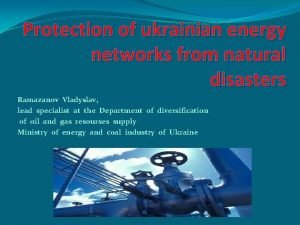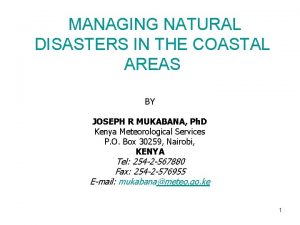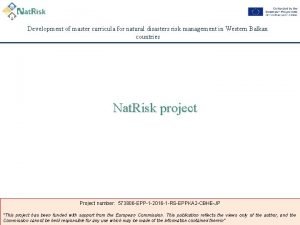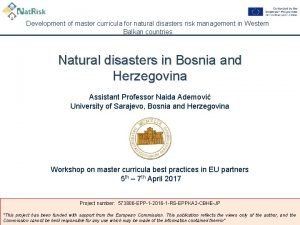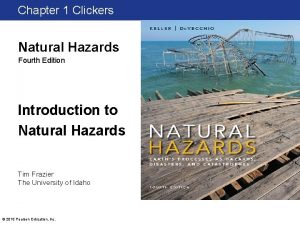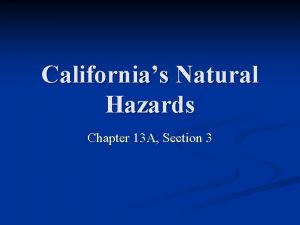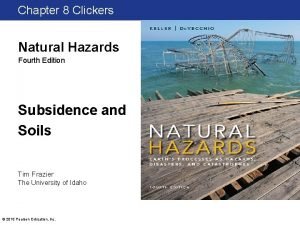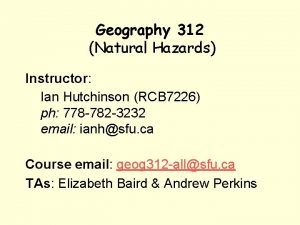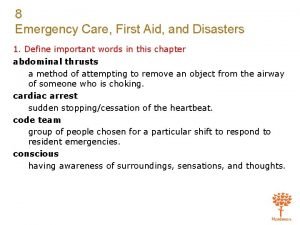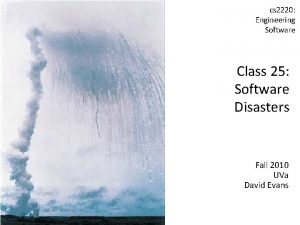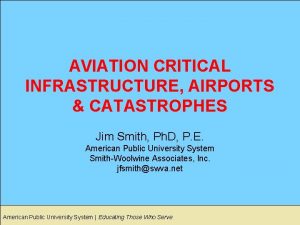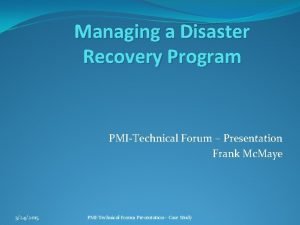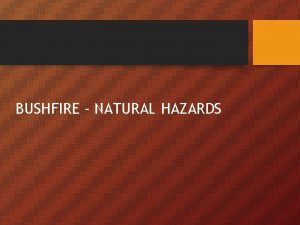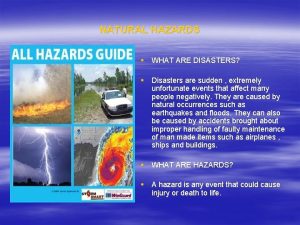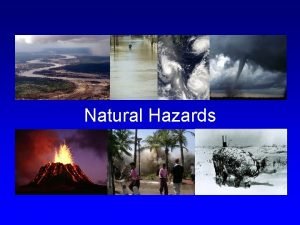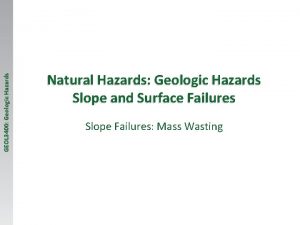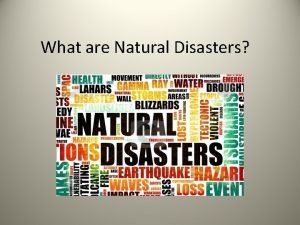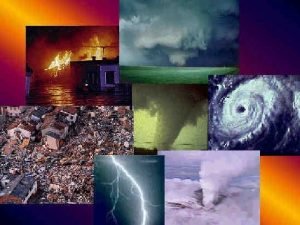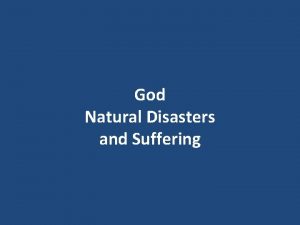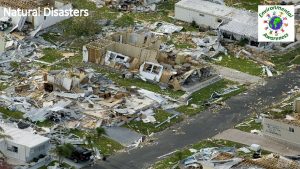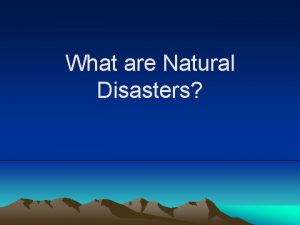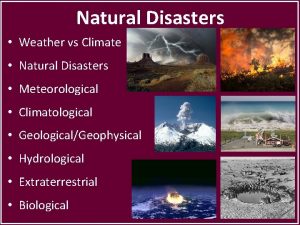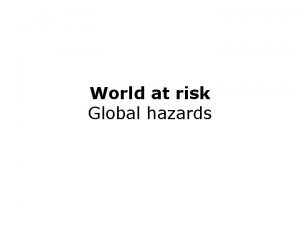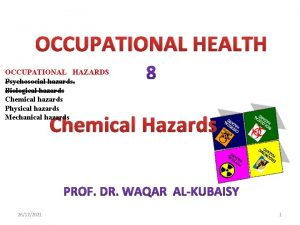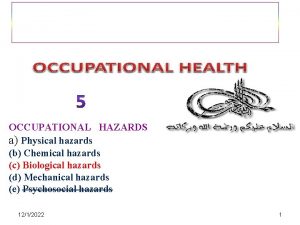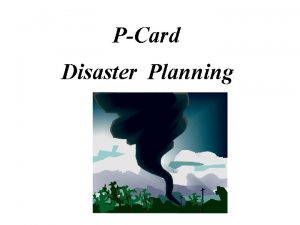Lesson 8 Natural Disasters 1 Natural hazards such




























- Slides: 28

Lesson 8 Natural Disasters 1

Natural hazards such as earthquakes, hurricanes, floods, and droughts spring to mind when the word “disaster” is mentioned. But a disaster should be defined on the basis of its human consequences, not on the phenomenon that caused it. An earthquake, for example, is simply an event in nature. Even a very strong one is not a disaster unless it causes injury or destroys property. Thus an earthquake occurring in an uninhabited area (as do scores of major tremors each month) is only of scientific interest and is not considered a disaster. 2

When a natural event does affect a human settlement, the result may still not be a major disaster. Consider the earthquake that struck San Fernando, California, in 1971. The quake registered 6. 4 on the Richter scale, yet the region around San Fernando Valley (with a population of over seven million people) suffered only minor damage and 58 deaths. Two years later, though, an earthquake of a magnitude of 6. 2 struck Managua, Nicaragua, and reduced the center of the city to rubble, killing an estimated 6, 000 people. 3

A disaster can be more precisely defined as an occurrence of widespread severe damage, injury, or loss of life or property with which a community cannot cope and during which the society undergoes severe disruption. 4

While some developed nations may be as prone to disasters as poor nations, the people of wealthier nations are not as vulnerable to disasters; they do not die in as large numbers nor does their environment collapse as easily. Both Tokyo, Japan, and Managua, Nicaragua, are prone to earthquakes. But the people of Tokyo are far less vulnerable to injury by earthquake because Tokyo has strictly enforced building codes, zoning regulations and earthquake training and communications systems. In Managua, there are still many people living in top-heavy mud houses on hillsides. They are vulnerable. 5

Landslides or flooding disasters are closely linked to rapid and unchecked urbanization that forces low-income families to settle on the slopes of steep hillsides or ravines, or along the banks of flood-prone rivers. In other disasters, such as cyclones and tsunamis, humans can increase their vulnerability by removing bits of their natural environment that may act as buffers to these extreme natural forces. Such acts include destroying reefs, cutting natural wind breaks and clearing inland forests. 6

In conclusion, natural hazards are agents or trigger mechanisms that can come into contact with a vulnerable human condition to result in a disaster. 7

Effects of Natural Disasters 8

Health Effects 9

Health Effects • Injuries • Spread of disease due to reduced standards of sanitation • Malnutrition due to food shortages • Lack of hospital space and medical supplies 10

Social Effects 11

Social Effects • Loss of family members • Disruption of transportation networks • Disruption of communication networks • Disruption of education 12

Economic Effects 13

Economic Effects • Disruption of the economy • Loss of jobs due to damage of buildings, etc. • Physical damage to businesses and industry • Loss of businesses • Disruptions in trade 14

Political Effects 15

Political Effects • Loss of leaders due to death or injury • Disruption of the government and its services • Damage to government buildings 16

Environmental Effects 17

Environmental Effects • Destruction and damage to houses and buildings • Destruction and damage of natural features of the environment • Decreased quantity and quality of water supplies • Destruction of crops 18

How are they different from natural hazards? Natural Disasters What are their effects? When are they global problems? 19

What makes a natural disaster a global problem? 20

Do you think the earthquake and resulting tsunami in Japan was a global problem? Why or why not? 21

For what natural disasters do you think Iceland may be at risk? 22

For what natural disasters do you think Iceland may be at risk? 23

In 2010 one of Iceland’s largest volcanoes erupted. It sent clouds of ash into the air. 24

Do you think the Iceland natural disaster was a global problem? Why or why not? 25

Airports closed as volcanic ash drifts toward UK Plume of ash from erupting Iceland volcano grounds flights across Europe, affecting tens of thousands of passengers. By the afternoon of April 16, most of Europe's major airports - crucial hubs for international travelers - were closed. Thousands of flights were canceled, stranding or delaying millions of passengers across airports from North America to Asia. It was the worst peacetime air travel disruption in history, a nearly weeklong halt in flights that cost airlines hundreds of millions of dollars and raised questions about Europe's ability to respond coherently to a crisis. 26

Have you changed your opinion about the Iceland natural disaster? Why or why not? 27

Michigan Citizenship Collaborative Curriculum Copyright © 2010 -2014 by Oakland Schools 28
 Natural hazards vs natural disasters
Natural hazards vs natural disasters Darkness conceals hazards such as
Darkness conceals hazards such as Unit 8 natural disasters
Unit 8 natural disasters Listening about natural disasters
Listening about natural disasters Environmental effects of natural disasters
Environmental effects of natural disasters Cordillera natural disasters
Cordillera natural disasters Presentation on disaster management
Presentation on disaster management Ancient natural disasters
Ancient natural disasters Three natural disasters
Three natural disasters Conclusion of natural disasters
Conclusion of natural disasters Conclusion on disaster management ppt
Conclusion on disaster management ppt Natural calamities definition
Natural calamities definition Natural disasters introduction
Natural disasters introduction Natural disasters
Natural disasters Natural disasters
Natural disasters Natural disaster unit 9
Natural disaster unit 9 Ancient natural disasters
Ancient natural disasters Natural hazards 4th edition
Natural hazards 4th edition California natural hazards
California natural hazards How does the study of soils help evaluate natural hazards?
How does the study of soils help evaluate natural hazards? Why is canada rarely impacted by natural weather hazards
Why is canada rarely impacted by natural weather hazards Natural hazards definition ap human geography
Natural hazards definition ap human geography Some natural resources, such as wheat and cattle, are
Some natural resources, such as wheat and cattle, are English language paper 2 rail disasters mark scheme
English language paper 2 rail disasters mark scheme Chapter 8 emergency care first aid and disasters
Chapter 8 emergency care first aid and disasters Software engineering disasters
Software engineering disasters Man made disasters conclusion
Man made disasters conclusion Most historians agree that military disasters
Most historians agree that military disasters Types of disasters
Types of disasters
